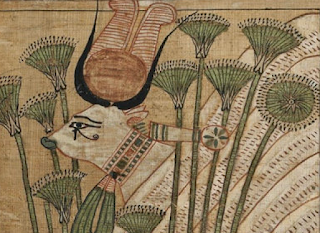Here is another very interesting object I've stumbled across in Louvre last weekend
It is a Hellenistic stela dated to the 4th-3rd c. BC, found in Umm al-Amad, Lebanon. The important bit of the description is circled in red
So...A ritual "watering of papyrus" by two (semi?) naked women...Anyone heard of this ritual?
I can bet that this is a fertility related ritual considering papyrus is watered by (semi?) naked women 🙂 That and the fact that it "recalls the Egyptian motif of annual renewal"...
But what does "Egyptian motif of annual renewal" mean? Well check this article: "Cow and calf ivory", in which I talk about the importance of papyrus in Egyptian mythology. Why it is directly linked to the annual flood. It is basically a plant calendar marker that marks the beginning of the rising of the water level in the river Nile, because the papyrus start flowering at that exact time...
Here is Hathor/Mehet Weret (Great Flood), emerging from the flowering papyrus...
Hence "annual renewal"...
Hence "ritual watering of papyrus"...The ritual imitation of the flood...Very interesting indeed...
I wonder if people in Umm al-Amad knew what this all meant? This stela is definitely not an import from Egypt. It was made locally. Depicting local people performing ritual papyrus watering...Which makes no sense in Lebanon...
Anyway another great example of a transplanted deified calendar marker. This time plant calendar marker...
To read more about ancient animal and plant calendar markers, start here…then check the rest of the blog posts related to animal calendar markers I still didn't add to this page, and finally check my twitter threads I still didn't convert to blog post...I am 9 months behind now...




No comments:
Post a Comment